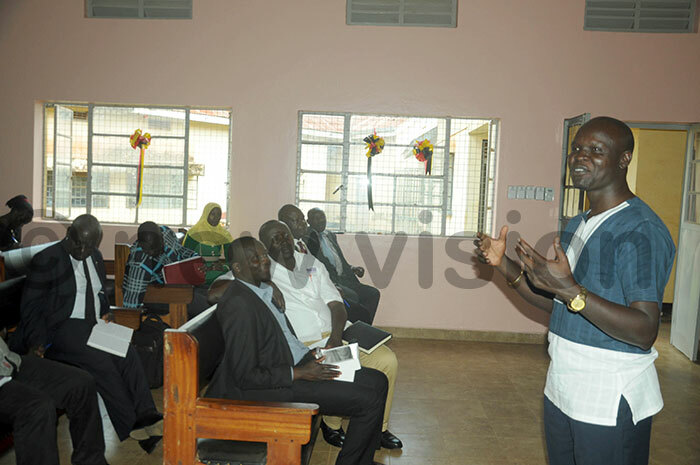Poor strategies affecting revenue collection in districts
Gulu district chairperson Martin Mapenduzi noted that every district has a revenue base which they can exploit, but they only need to lay better strategies.
Gulu CAO Milton Kato addressing district leaders on enhancing local revenue collection during a workshop at Gulu Council Hall. Photos by Jeff Andrew Lule
Richard Okuku, an economist with the Uganda Local Government Association (ULGA), has blamed the rampant shortage of funds in local governments to lack of strategies needed to boost revenue collection.
"Yes we agree, there is still inadequate funding of local governments, but leaders in different districts have not played their role of planning to improve the lives of those they lead," Okuku said.
Okuku said local governments have a role of coming up with strategies on how to raise local revenues to supplement the meager funding from the Government to achieve their targeted goals.
"Local governments must have targets of what they want to achieve every financial year and plan on how they intend to raise the revenue. We realised many districts have not put in place strong systems to raise local revenue and only wait for the small budget from the Government," Okuku said.

Mapenduzi addressing district leaders during the workshop
Last week, ULGA with support from Action Aid International Uganda organised a workshop of district leaders to discuss local revenue improvement in Gulu district.
The workshop organised under the theme; Local revenue enhancement and management as a key driver for improved efficiency and effectiveness in delivery of public services, funded by Democratic Governance Facility (DGF), was attended by leaders from Nebbi, Masindi, Lira, Arua, Pakwach, Zombo and Adjumani districts.
Speaking during the workshop, Okuku said many district technocrats spend time fighting wars with the political wing instead of coming up with strategies to improve local revenue collection.
"There are so many avenues from which local governments can raise revenue. As district leaders and technocrats, you must come up with innovative ways and systems to raise revenue," he added.
When Okuku asked them whether they all had registered their taxpayers and their business, many just looked on; an indication majority had no records of who their taxpayers are.
"How do you expect to collect revenue from the businesses you do not know. You must have records of businesses and locations. This should go down up to the parish level. This helps you to know the defaulters and makes your audits easy. You can even sit down as leaders and technocrats and streamline on how you can raise revenue through setting up your ventures," Okuku noted.
He stressed that a recent ULGA survey shows that 90% of the districts' budgets are funded by Central Government, which makes it hard for the districts to invest in priority areas such as health, education and agriculture, among others.
Gulu district chairperson Martin Mapenduzi noted that every district has a revenue base which they can exploit, but they only need to lay better strategies.
"This can only be successful when leaders and technocrats work together. The problem is many districts are embroiled in endless conflicts thus leading to sabotage of programmes," he added.
He said Gulu has made huge progress because of unity.
He said Gulu used to collect sh240m-sh500m, but now they collect up to a billion shillings in local revenue.
"This has helped us to pay our councillors well and provide more services to the people. Our councillors can now earn about sh690,000 per sitting," he said.
Mapenduzi said they constructed a stadium, markets and signed strategic partnerships with Uganda Management Institute (UMI), Toyota Uganda and U-Touch Company, among others where they get monthly revenue.
The district is also planning to establish a tree plantation for fast-maturing trees and a citrus plantation.
Milton Kato, the Gulu CAO, asked technocrats to always engage councilors and other leaders in planning to smoothen their strategies.
He said good governance is key in raising revenue collection since it is where decisions are made.
"With good governance, you will not have conflicts. Conflicts are a waste of time," he added.
Kato advised districts to always set up revenue targets, establish comprehensive revenue registers, establish revenue enhancement committee at district and sub-county to always